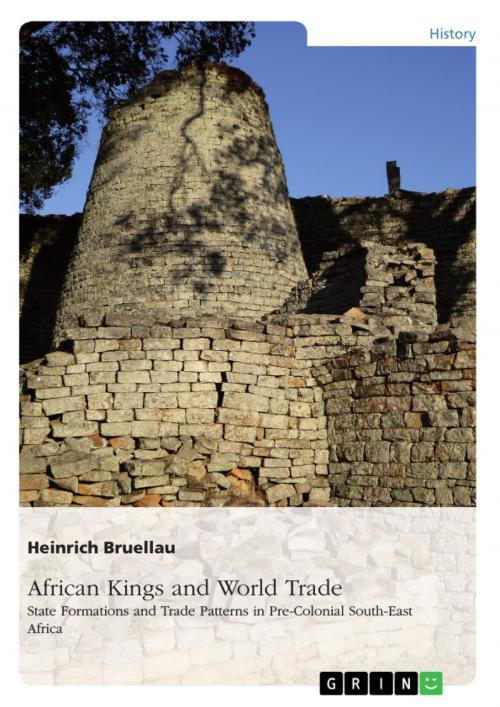African Kings and World Trade. State Formations and Trade Patterns in pre-colonial South-East Africa
And their relation to the Indian Ocean Rim before the arrival of the Europeans
Nonfiction, History, Africa| Author: | Heinrich Bruellau | ISBN: | 9783668572683 |
| Publisher: | GRIN Verlag | Publication: | November 15, 2017 |
| Imprint: | GRIN Verlag | Language: | English |
| Author: | Heinrich Bruellau |
| ISBN: | 9783668572683 |
| Publisher: | GRIN Verlag |
| Publication: | November 15, 2017 |
| Imprint: | GRIN Verlag |
| Language: | English |
Anthology from the year 1999 in the subject History - Africa, grade: 2,0, University of Hamburg (Afrikanische Studien), language: English, abstract: In Europe a lot of historians have worked on African history for the period after the continent came under colonial rule. But little has been written about African states contemporary to the European medieval period, i.e. before the Europeans arrived in Africa. Especially the history of south-eastern Africa has been mostly the domain of white southern African researchers, archaeologists, historians and 'discoverers' in the 19th and for the major part of the 20th century. Only since the independence of Zimbabwe has a new generation of African researchers come to the fore. But their work has been largely neglected in European literature. The author tries to bridge this gap. The work is particularly interesting as it tries to correlate the findings of three disciplines: History, Archaeology and Ethnology. With the latter's particular subject of oral traditions Ethno-History can make a strong contribution, where written sources end. Archaeology is important as early African societies did not produce written records. But there is one element of sources which can help to go back in time from there: the writings of Islamic travelers and reporters, which give rich evidence of the connections of their world to the south-eastern African region from the 8th century onwards. Putting all these elements together the author gives a clearer picture of the formation of states in that region of Africa and the role they played, after they contacted global trade which centered around the Indian Ocean rim, before the Portuguese and later other European powers destroyed that network of independent partners and replaced it by their own protectionist colonial rule. More work has to be done. Heinrich Bruellau, a historian at heart, had to earn his living as a manager and consultant. His many travels led him to Zimbabwe and other countries of the region, whose liberation struggle he had supported from the beginning. He followed on the lead of his historian gene to engage with researchers of the region. He even had the honour of meeting Peter Garlake, the great old man of Zimbabwean archaeology, in his home, but also got encouragement from Dawson Munjeri, who is now the representative of Zimbabwe at Unesco. With this book, he is inviting researchers to invest more work into the global trade network of the medieval period in order to get a better understanding of the importance of the African contribution to world trade long before it was subjected to subjugation by colonialism.
Anthology from the year 1999 in the subject History - Africa, grade: 2,0, University of Hamburg (Afrikanische Studien), language: English, abstract: In Europe a lot of historians have worked on African history for the period after the continent came under colonial rule. But little has been written about African states contemporary to the European medieval period, i.e. before the Europeans arrived in Africa. Especially the history of south-eastern Africa has been mostly the domain of white southern African researchers, archaeologists, historians and 'discoverers' in the 19th and for the major part of the 20th century. Only since the independence of Zimbabwe has a new generation of African researchers come to the fore. But their work has been largely neglected in European literature. The author tries to bridge this gap. The work is particularly interesting as it tries to correlate the findings of three disciplines: History, Archaeology and Ethnology. With the latter's particular subject of oral traditions Ethno-History can make a strong contribution, where written sources end. Archaeology is important as early African societies did not produce written records. But there is one element of sources which can help to go back in time from there: the writings of Islamic travelers and reporters, which give rich evidence of the connections of their world to the south-eastern African region from the 8th century onwards. Putting all these elements together the author gives a clearer picture of the formation of states in that region of Africa and the role they played, after they contacted global trade which centered around the Indian Ocean rim, before the Portuguese and later other European powers destroyed that network of independent partners and replaced it by their own protectionist colonial rule. More work has to be done. Heinrich Bruellau, a historian at heart, had to earn his living as a manager and consultant. His many travels led him to Zimbabwe and other countries of the region, whose liberation struggle he had supported from the beginning. He followed on the lead of his historian gene to engage with researchers of the region. He even had the honour of meeting Peter Garlake, the great old man of Zimbabwean archaeology, in his home, but also got encouragement from Dawson Munjeri, who is now the representative of Zimbabwe at Unesco. With this book, he is inviting researchers to invest more work into the global trade network of the medieval period in order to get a better understanding of the importance of the African contribution to world trade long before it was subjected to subjugation by colonialism.















